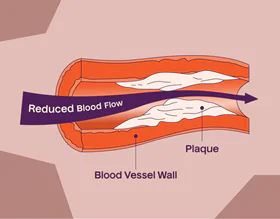
Reduce your drinking
Find tips, strategies and advice to help you reduce your drinking.
The evidence continues to grow stronger, showing that no amount of alcohol is good for heart health. Even small amounts of alcohol increases your risk of developing diseases of the heart and blood vessels, also known as cardiovascular disease.1,2
Alcohol is a major risk factor for high blood pressure (hypertension). High blood pressure is a condition where your blood pumps with more force than normal through your arteries or blood vessels. It is the leading cause of cardiovascular disease, including heart disease and stroke.2,3
It can be a combination of factors, including:4

Over time, high blood pressure puts strain on the heart and can increase the build-up of fatty material (plaque) in blood vessels.4
This can lead to blocked arteries that supply blood to the heart, brain and other vital organs, causing heart disease, heart attack and stroke.
Click below to learn more about the main types of cardiovascular disease.
The most common type of heart disease is coronary artery disease. This is when the arteries supplying the heart with blood become narrowed and the heart can’t pump like it should. This can lead to heart attack.
A heart attack happens when the flow of blood to the heart muscle suddenly becomes blocked and the heart can’t get oxygen. If blood flow isn’t restored quickly, the section of heart muscle begins to die.
High blood pressure is a major risk factor for heart attack.
Atrial fibrillation is an irregular and rapid heartbeat that can lead to blood clots in the heart. This increases the risk of stroke, heart failure and other heart problems.
Over the long term, it has been shown that just one alcoholic drink per day is linked to higher risk of developing an irregular heartbeat compared to those who don’t drink alcohol.
Heavy drinking on a single occasion can also trigger an irregular heartbeat. This is often known as ‘holiday heart’ since there are usually more cases around holidays when people drink more alcohol.
Over the long term, alcohol use can cause the heart to stretch and enlarge. As the muscles stretch more over time, they are weakened, like a rubber band when stretched too much. This stops the heart from pumping as well as it should and increases the risk of heart failure.
A stroke happens when blood can’t get to the brain. This causes brain cells to die from lack of oxygen. There are two kinds of stroke:
High blood pressure is a major risk factor for stroke.

There's no safe level of alcohol use for heart health. In recent years, clearer evidence has emerged about how even small amounts of alcohol can increase the risk of cardiovascular disease.5,6
If you do drink, the Australian Alcohol Guideline for adults recommends a maximum of 10 standard drinks a week and no more than 4 standard drinks on any one day to reduce the risk of alcohol-related harm.
The less you drink, the lower your risk of harm.
Page last updated11 July 2023